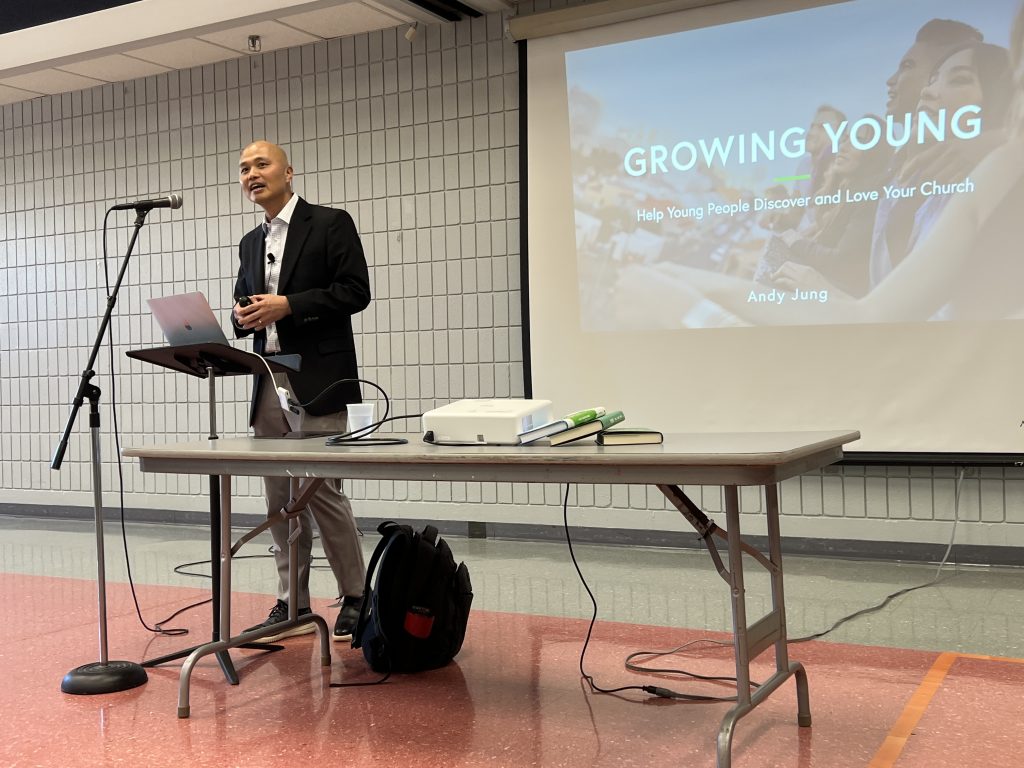
The numbers don’t paint a promising picture of Christianity in America, especially when it comes to young people.
Consider these stats that Andy Jung shared on Sunday during his session, “Growing Young,” about how churches like First Pres can be more welcoming to young adults, or those from age 18 to 29.
- 1 in 2 young people will drift from the church after they graduate high school, “even,” Jung says, “when they don’t think that’ll be true.”
- 2 in 3 people age 18-23 drop out of the church, fueling most denominations in America to either be holding steady or declining, with very few growing.
- The percentage of self-identifying Christians in America has declined from 77% in 2009 to 65% in 2019, and the number of those with no religious affiliation (“nones”) has risen from 17% in 2009 to 26% in 2019. One-third of all young adults consider themselves “nones.”
- Among all the generations, millennials, or those born from 1981 to 1996, have the lowest self-identification as Christians.
“These aren’t great things to hear,” Jung admits, but rather than being pessimistic, he sees the opportunities for churches to “recalibrate” their mindset around young people. In other words, how can churches grow in the way they relate to young people?
“There’s no real short answer,” Jung admits. The Fuller Youth Institute, where he works, has spent years studying the questions, though, and Jung suggested several places churches like First Pres can grow.
“Every church can grow younger given the right attitude around young people,” Jung says.
The foundation is not seeing reaching young people as primarily about getting them to the church, but rather in going to them and knowing them. Jung calls this “a Jesus-centered community.”
In community, we learn to be empathetic toward young adults who are facing challenges that other generations have not: deep anxiety, a more chaotic path to “success” and many questions over identity and meaning.
“We take the first step,” Jung says. “The lynchpin to all of our work with young adults is empathy because it’s all about relationships.” Jung emphasizes that young adults crave “warm community” where the message is “you matter; we want you here.”
Deeper community draws young adults into all aspects of the church, seeking their input and mentoring them as leaders. This grows young people and their older counterparts as they learn together, Jung says.
And learning together also means intergenerational exploration of Jesus’ message. Young adults care not just about information but how to apply it and make it part of their lives. “They want to take Jesus’ message seriously,” he said.
Jung says some people get nervous when they hear his message that young adults need to be a priority for churches because they think others may be left behind. But Jung has seen the opposite in his work.
“We all benefit” from investing in young adults, he says. “When we reach young people, we add to the vitality of the whole church. Everyone wins because of that.”
Jung emphasized that First Pres is “uniquely positioned” for this work given its location in a downtown surrounded by colleges and universities.
So, how can you get involved in building relationships with young people? Where does this all start for you? Jung says each person can start with the young people they know: their children, their children’s families, their grandchildren, their coworkers.
“Start where young people are,” he says.
And then remember: the goal is building relationships. “The goal is not getting people into church,” he says. “We want to do that, of course, but that’s not where it starts.”
You can read more about Fuller’s research in this area in the book, “Growing Young.”
